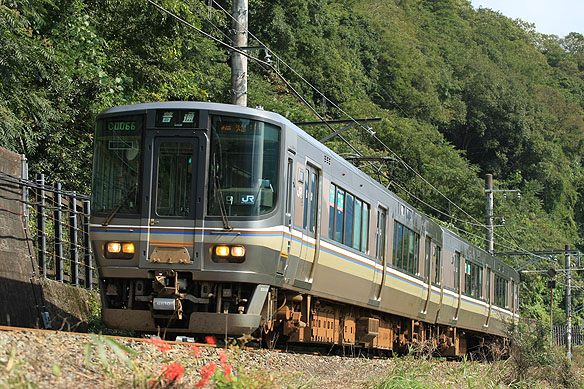Background and overview
In 2008, JR West relocated 4-car sets of 221series from Aboshi depot and built 2-car sets of 225-5500 series vehicles to replace 113/115 series vehicles, which were not equipped with the ATS-P signaling system, used on Sagano/San-in line, to introduce ATS-P signaling system to Sagano/San-in line.
Car body
They have 2950mm wide body with bead-less skin, incorporating light weight
stainless construction. Bodies are unpainted and have the beige, brown,
white and blue waistline band running the length of each car below the
windows. They also have brown accents applied at door cases. They are distinguished
by an orange stripe on the front gangway doors between the headlight clusters
in order to distinguish different performance from 223-5000 series brothers.
Their cab end is constructed by streel, having spacious windscreens and
a gangway at the centre, with the same shape caused by having gangway connection
base from 223-5000 series. Cab section and end structure are fitted to
their main body by bolts to ease fitting a cab section to the intermediate
cars to make the end cars from intermediate cars. Their body was introduced
some strength improvements such as the reinforced connections between their
underframe and their side construction, the reinforced connections between
their side frame and their roof rafter, reinforced side construction against
the lateral collision, reinforced connections between their end post and
their underframe against the offset collision to name a few. They are equipped
with three 1300mm wide double-leaf automatic sliding doors on each side
of the vehicles. Door operating equipments, WTK112B, are fitted above the
door header of the sliding doors which can be operated manually by pushing
the buttons fitted beside the door. Horizontal band of 5 set windows including
2 drop windows having 950mm height are fitted between the doors. Roller-binding
train-type indicators and LED destination indicators are fitted on each
side of their body. LED displays showing "Entrance" or "Exit"
are also fitted beside sliding doors located at the front/end of their
body. An additional window is fitted on the end plate to ensure the visibility
from the driver's cab. All vehicles employ two air conditioners, WAU705B,
rated at 20,000kcal/h/unit on their roof. Loudspeakers, providing guidance
broadcast for passengers waiting at a station, are fitted inside each air
conditioner. Electric fans of air conditioner supply fresh air into the
passenger room, instead of ventilators on the roof. End cars are equipped
with the automatic jumper coupler to ease rush-up operations.
Bogies
The 223-5500 series are equipped with WDT59 bogies on the powered cars
and WTR243E bogies on the trailers, featuring bolster-less secondary air
suspension and trailing arm link journal box supporting system. Their bogies
employ the single link traction device. Their bogie employing bow-shaped
bogie frame to lower the fitting position of bolster suspension realizes
to lower the floor level. These bogies adopt the yaw dampers and anti-rolling
stabilizer to ensure smooth ride characteristics even at 130km/h regardless
of their maximum service speed at 120km/h. Motored bogie employs single
tread brake device. Trailer bogie employs both the double disk brake device
and the single tread brake device.
Traction unit and ancillary equipments
All motored cars are equipped with a 3-step variable frequency drive traction
system, WPC13, featuring Insulated Gate Bipolar Transistor (IGBT) controls
four asynchronous traction motors, WMT102C, with a power output of 220kW
on axle basis. Their traction system is integrated with the high-power
auxiliary power supply unit with a power output of 150kVA. In case of the
auxiliary power supply unit failure, one variable frequency drive unit
for traction motor can switch to supply electricity as the backup auxiliary
power supply unit. The temperature class of their traction motor is changed
from class H (180°C) into class 200 (200 °C) to prolong their lives.
Their WN coupling is changed into clow noise type. Motored end vehicles,
class kumoha223, are also equipped with a motor driven rotary-screw air
compressor, WMH3098-WRC1600, under their floor. All motored vehicles are
also equipped with a cross arm type current pickup, WPS27D, with the protection
against heavy snow, and prepared to be fitted with another current pickup
on their roof. Some motored vehicles are equipped with a second de-icing
current pickup. They feature the electric commanding brake with regenerative
brake and holding brake, featuring brake control of trailer priority. Their
signaling system employs ATS-SW2 featuring the detection using spread spectrum,
and ATS-P2.
Accommodation
Seating accommodation consists of 2+2 abreast switchable transverse seating
and longitudinal bench seating at the ends of cars. They adopt the curved
lighting cover made of the glass fiber. The ticket machine, which put the
ticket indicating the boarding station, is located beside doorways at the
end of their body. The fare LED display and the fare box are located behind
the motorman's cab. A LED display for providing passenger information displays
in zigzags and door chimes are fitted above the door header of the sliding
doors. Trailer end cars, class kuha222-5500, are equipped with a universal
access toilet employing vacuum toilet system and a wheel chair space
Operations
223-5500 series entered the revenue services of Fukuchiyama line in July,
2008. They also entered the revenue services of San-in and Maizuru lines
in August, 2008.
Modification
The prominent anti-fall plates on the front ends were began to be fitted
from 2015. Their fare display was changed into the LCD display.
Latest operation status
223-5500 series are now used on the rural services of the Fukuchiyama line between Sasayama-guchi and Fukuchiyama, the San-in line between Kyoto and Kinosaki-Onsen, and the Maizuru line. |
|
|



